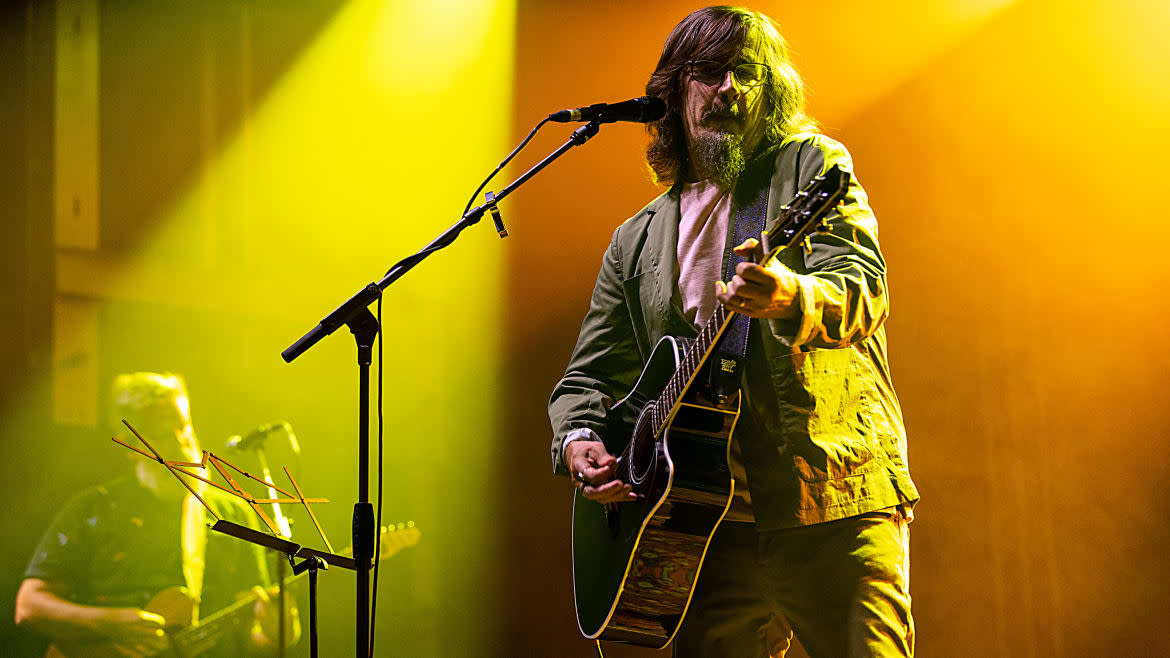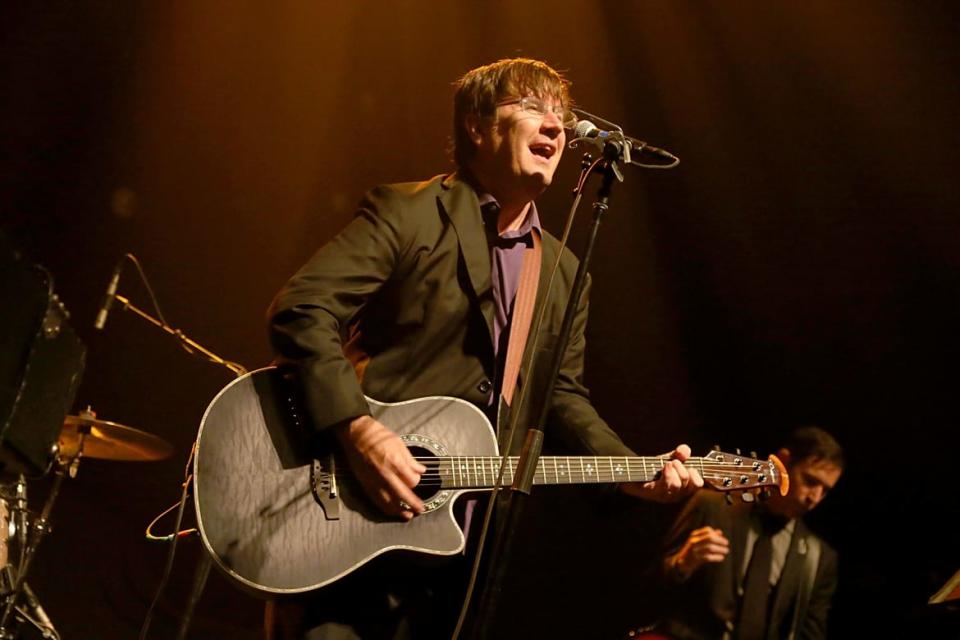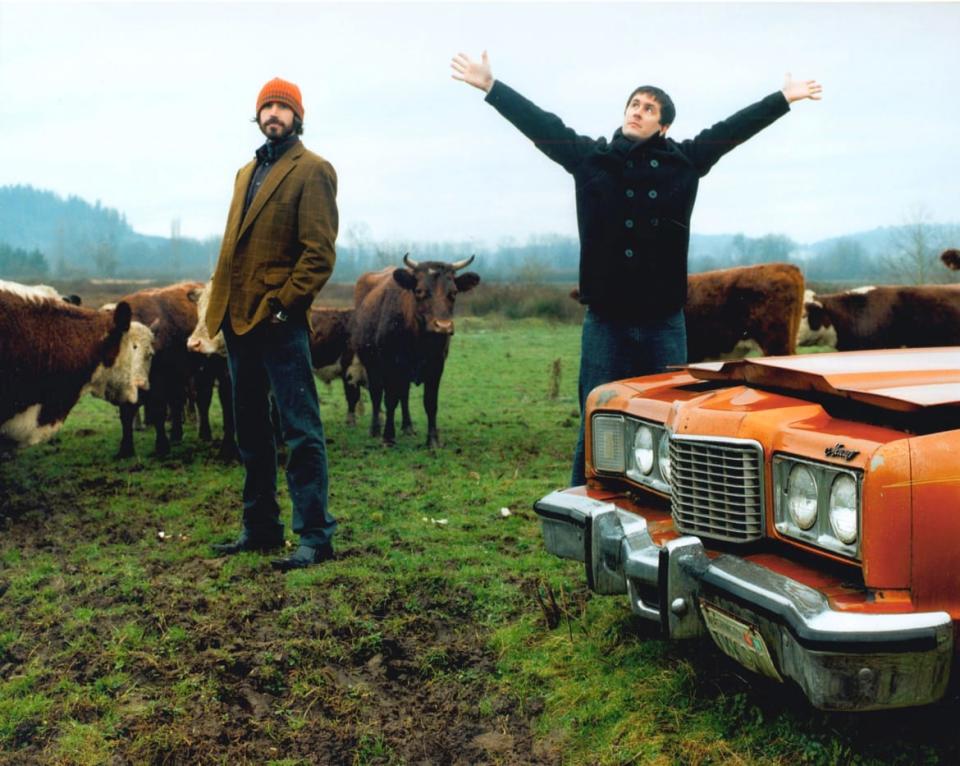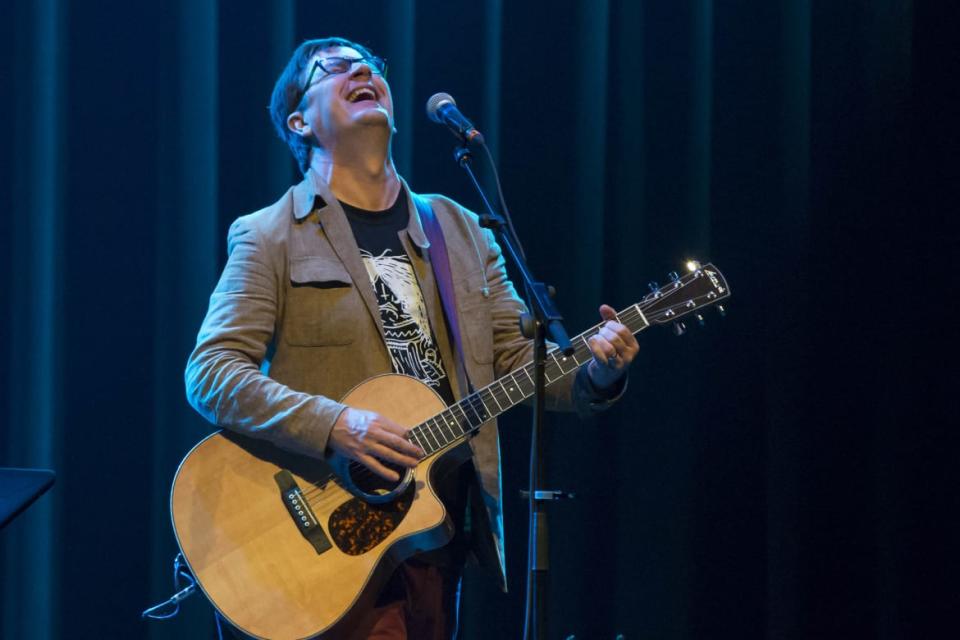John Darnielle Is Listening: New Album, New Book, New Thoughts

One does not simply “chat” with John Darnielle.
I realized this after about an hour. But my sprawling conversation with the Mountain Goats frontman, which ran the gamut from creative practices and vintage novels to the Adult Swim cartoon Morel Orel, retiring songs from the setlist and Nintendo tattoos, was all the better for it. (He’s got a Baby Bowser tat on his shoulder, FYI.)
John Darnielle is easy to talk to, for one. He’s as generous a listener as he is an engaging speaker. He’s also deeply thoughtful and thought-provoking.
He’s also someone you can quickly connect with. That won’t surprise anyone that’s listened to a Mountain Goats album—of which there are literally dozens, including live recordings, EPs, and demos. Darnielle has been performing under the moniker for longer than I’ve been alive. His unique talent for writing songs that conjure visceral imagery and spin intimate yarns has earned the band its reputation: highly literate, empathetic, and engrossing.
Yet Darnielle has never run out of steam. The singer-songwriter is impressively adept at keeping things fresh, whether it’s plucking out songs from the back catalog for the band’s live shows or writing a concept album about Dungeons and Dragons. He’s even tried his hand at writing a book or four; Darnielle’s most recent novel, Devil House, a true crime novel about a true crime novelist, hit shelves this past January to widespread acclaim.

The Mountain Goats performs in concert in Austin, Texas.
For Bleed Out, the band’s latest record, Darnielle was inspired by watching action movies during lockdown. The result is an at-times raucous, other-times haunting album about, well, action movies. (Lead single “Training Montage,” for example, is literally about the part of a movie where the hero beefs up and prepares for battle.) It sounds silly, and it sort of is. Yet there’s no one better at mining some real beauty out of an unexpected premise than Darnielle. It’s why, three decades on, the Mountain Goats continues to command a devoted fan base at sold-out shows around the world.
Below is a condensed version of our conversation, in which we discuss how Darnielle sustains himself creatively, manages fan expectations, and what it’s like to suddenly become a TikTok sensation.
Soccer Mommy and the Unexpected Healing of ‘Sad Girl Music’
This is the 21st album, right? I think the 21st Mountain Goats album, at least.
So I’m told. It’s at least the second one.
There’s been at least one other album. How do you continue to mine creative energy and inspiration for your music this far in, without it shifting dramatically in quality as well?
I can’t take any real credit for it. It’s just that that’s who I am—I’m gonna be working… I think that it’s labor. It’s based on skills that you acquire, that you study and you practice and you learn. You read people who are listening to people who are better than you are and understand that that’s who they are to you… That’s what you do when you study anything. You study people who are good at it and adopt their practices until they become your own.
That’s good advice.
I could choose to say God strikes lightning in my brain and I do something, but I don’t think of it that way at all. Sometimes I’m not hitting on all the cylinders. Sometimes I sit down to write and it’s not coming out, but I don’t think of that in terms of not feeling inspired… “Monday” happens in every field. Maybe you’re a little rusty, or you didn’t eat well enough, or you didn’t get enough sleep, or got too much sleep. Thinking about it in that frame means that I can work every day… I 100-percent guarantee you I could write a song a day for the rest of my life. No problem. Are they all gonna be good? Absolutely not. Are they gonna get repetitive if I’m doing that instead of playing aimlessly, messing around? They will start to just sound the same song.
Is that how you worked on Bleed Out?
I wrote Bleed Out in a very short space of time, and it was real nice. I was happy with the songs I had, and then I stopped, because you’re gonna start repeating yourself. You have to take breaks in order to come back into the practice. We are sort of acclimated, not without reason, to think, “Fuck, I have to go to work.” That’s because the way that they make work for you now sucks dick… [But] any good job is an art, if you’re doing it in a way that’s pleasant for you and the people you’re doing it for.
It’s great that you still have love for what you do. I consider myself a writer too, and I do love to write. But with it being my job, I feel a sense of burnout. I even dislike writing a lot of the time these days.
Because you get assignments. If somebody says, why don’t you write a song about this, then I don’t wanna write that song, because it wasn’t my idea. [He points at the screen.] You have an Akira poster behind you—so gimme 12 anime prompts, and I’ll do 12 songs, and that’ll be the album. We’d probably make an amazing record. But if somebody says, “Hey, write a song about X or Y,” I’m like, no, that’s not my gig. I’m not that type of writer. I would have to change the way I think of things.
Is this something you’ve always known about yourself—that you need to be inspired organically to do the work? Or did you try and fail to write what was required of you?
I think in school I had some of those “do this” [writing] prompts, and I didn’t like it… I’m kind of ashamed of this because I feel like if I was as powerful as I would like to be, expectations wouldn’t affect me in any way. There was a point at which I stopped writing funny [Mountain Goats songs]. Everybody in the early fan base noticed it, like, “There’s no jokes on this one.”
Death Cab for Cutie’s Ben Gibbard Is ‘I Think You Should Leave’s’ Number One Fan
Why did you decide to stop?
This was traceable specifically to a person whose name I’ll never know at the open mic night where I used to premiere my new stuff… I sat down and the room was pretty full. I was part of the attraction for the open mic night. People would come to see me play at that point. When I sat down, somebody said, “Oh, check this guy out. He’s really funny.” I didn’t say anything. I just heard it, but I immediately was like, okay, well, you know what? No more funny songs. I don’t wanna be the guy who does the funny stuff. I don’t want that expectation on me. I think many people feel this.
The expectation bothered you.
If there’s fan expectation on me, it immediately bristles. That becomes a conflicted thing, because I also have a very strong desire to give people what they want from me. Especially if they’re people who I have a relationship with, like the audience—I want them to get what they came to get.I want to please them. I have a very, very strong desire to please them. These things are at odds, because I really wanna please people, but I really don’t wanna have to be writing things. I don’t wanna be telling the joke people came to hear. I don’t wanna be repeating myself.
Do you feel a different kind of pressure or anxiety when writing books versus music? Does working for the publishing industry come with any new obligations, compared to the music industry?
I’m really grateful for this question. The question I get a lot is, “What’s different about writing a book from writing music?” I say, “What’s different about baking and cooking. They’re the same thing, but, you know, different.” There’s not a good answer to that question.
But to this one, as far as industries go, they are very different. Music is a daily, constant thing. There’s a lot more stuff that faces the public, and live music is what music actually is. The rest of the industry is an attempt to make something else out of the essence of music. Books are different inherently. The act of writing one is this long process. You sit with a novel for years. The new one [Devil House], so much changed about it while I was writing.

Posed group portrait.
I have so much respect for that, as a person in an industry where it can often be very hard to ignore all the business behind it and inside of it. I have to pay attention to what everyone else cares about all the time.
When I’m writing books, I’m not even thinking about whether it’s going to be about what people might or might not be interested in, or whether it speaks to the moment. I have these ideas about books being something that, 100 years from now, might still be interesting to somebody. I don’t want to be writing something that will be of the moment. For me, that means not thinking too much about the industry, and not trying to think about where our culture is at.
Hardcore Mountain Goats fans seem to always be on board, no matter what. The fanbase is known to be very dedicated. What’s your relationship to them at this stage in your career?
If you come see the Mountain Goats, you’re gonna hear “This Year.” That’s gonna happen by the end of the night. You ain’t gotta yell for that one. And usually “No Children” too. Some people came specifically to hear those songs. That’s not a vibe I can really relate to. When I go see an artist, I’m there for the show.
Right. And hopefully most people are.
But also, within at least our fanbase, I don’t think there are people who just want what they already knew they were gonna get. You want the same action, the same vocabulary, and you get that. But I think most people who are into music wanna see the artists they like growing and changing and going new places… As long as what you’re bringing live takes people to some transcendent place, it doesn’t have to be what they expected.
And if they’re fans, they appreciate that.
There’s something [fans] divined in our music when they first heard it. and that’s the thing they hope to get. My hope is always that you can find that essence, whether I’m yelling or not, whether I’m jumping up and down or not. I do feel obligated to provide, and I don’t think obligation is a bad word in that sense. I am there, like I say, to please people. I want people to feel pleased when they leave, like they got enough of what they came to get.
Also, from a creative standpoint, selecting from such a large body of work and evolving the setlist must help you keep things entertaining when you’re performing.
When there’s a new record, you want the new songs to become standards. But also, they are brand new, people don’t know them yet, and they’re not gonna be as good by us yet usually, because the ones you’re best at are the ones that’ve got a little road wear. I believe in the set as a sort of organic artistic unit. A live performance is its own thing that you can’t even get from a live recording of it. It happens in this room happens once only. The set list is the bones of the thing that happens—you construct the skeleton and then the flesh gets on it as you play it.
It’s good that there are fan favorites that always make it onto that flesh.
We’ve played “This Year” and “No Children” more than anything else, over and over and over again… I am literally never tired of them. When I get to them, I’m always excited to play them, because I know people are excited to hear them…
There’s [also] songs you do get sick of playing. That’s an OK reason to throw something out. I try not to let people know if I think the song they want to hear is one that I’d rather not play. At least let them think you just didn’t get around to it.

Mountain Goats perform at ACL Live at the Moody Theater.
“No Children” went viral on TikTok last year. What’s it like to now have people who maybe aren’t familiar with the rest of your songs come see you just for that one?
[This happened in] Brooklyn the last time—I wondered how [these people] got in, because those tickets sold out super early. I’m like, did you pay a lot of money just to hear “No Children?” I can't imagine. I mean, God bless you—although that money doesn’t go to me. It goes to the ticket broker.We got to “No Children” at the end. And there was a rush of people, drunk people from the back. They would rush up to the front and push people outta the way, which is not cool. I just can’t imagine going to a show to hear one song.
The song became a meme, in a way. People feel the need to prove their level of investment. They want to take the bit as far as they can go with it, to show they’re committed.
That’s incomprehensible to me. That’s like a science-fiction scenario. They’re so into proving that they’re engaged with this thing that they get this other thing that they wouldn’t otherwise like. [At the same time,] that is your chance to get them to check you out, and that’s what you want as a musician, is to establish that communication with people.
If they hear what we do, they might find something… pleasant or helpful. And that’s a blessing in this world, for me to have been useful. That’s the reason you play your viral hit with pleasure and gusto. You wanna hear this? Check out what else I got. I bet you will like that also. Which sounds kind of corny, but it’s true.
The Mountain Goats’ new album Bleed Out is available now.
Get the Daily Beast's biggest scoops and scandals delivered right to your inbox. Sign up now.
Stay informed and gain unlimited access to the Daily Beast's unmatched reporting. Subscribe now.


